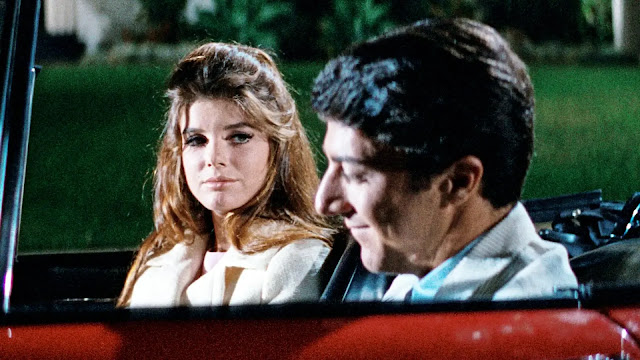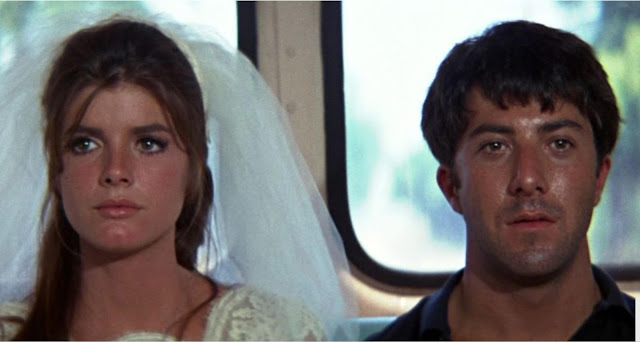Newcomer Mike Nichols crafted back in 1967 a film that tasks us to simultaneously laugh and to look inside ourselves and realize that many of us can relate to the character of Benjamin Braddock (Dustin Hoffman) in all his awkwardness and would act in very much the same way that he does. That’s not to say many of us are looking for an opportunity to have an affair with a married older woman, but when put in the same positions he is put into, many will ultimately succumb to temptation and falter. We cannot all be as stoic and righteous as Joseph fleeing from the advances of Potiphar’s wife.
Nichols seems to be evoking the British style of comedy filmmaking that was beginning to be prevalent in 1960s mainstream cinema where the comedy comes from the situations and not from any pratfalls, jokes, or mugging to the camera. There are no moments in The Graduatewhere the film stops to emphasize the humor or to allow slower viewers to catch up. You are expected to meet this film at its own pace, and if you cannot do that, then you may find some of it stilted and slow. For those who are prepared to tackle this one, there is a tremendous amount of humor to be found, some of which is even of the laugh-out-loud variety. It’s a romantic comedy but not of the type you’ve seen before or since. This one just hits differently than what you can expect, especially if you were going into it blindly as many did when it first debuted.
The Graduate was based on a novella written by Charles Webb, a minimalist author who intentionally lived a life of poverty, donating any money he did earn to charities while living out of a VW Bus parked on campgrounds, trailer parks, and even nudist colonies. He was truly a unique individual who saw no personal value in worldly possessions, nor in things like the institution of marriage or the American educational system. He sold the rights to his story, The Graduate, for a one-time payment of $20,000 and never made another cent off of those rights. It could have earned him a large fortune, but he was not the type of person who cared about such things. This lifestyle seemed to work for him, though, as he stayed alive and happy up until his passing in 2020.
The Graduate tells the story of Benjamin Braddock, a recent college grad who would be content being left alone for a few months while figuring out the next path to take in his life. But his parents insist on dragging him out of his room to show off to their friends and neighbors and to shower him with awkward accolades. While attending one such party, he retreats to his room only to be approached by Mrs. Robinson (Anne Bancroft), a friend of the family. She asks him for a ride home, then tries to seduce him once they get there. Benjamin freaks out over this proposition and tries to flee, only to be kept from leaving when she blocks his access to the door. The only thing that saves him is the timely arrival of Mr. Robinson (Murray Hamilton).
Things would have turned out a lot differently had things ended there. But Benjamin, after some time to reflect on that night’s events, calls Mrs. Robinson up and accepts her offer of an affair. They meet up at a hotel and, after some incredibly awkward and suspicious behavior, he manages to secure a room for them. For the remainder of the summer, he spends his time either floating in his parents’ pool or meeting Mrs. Robinson at the hotel. At some point, she confesses to him that she only married her husband after getting pregnant with their daughter, Elaine (Katharine Ross). Benjamin makes an off-the-cuff joke about dating her daughter, who is currently attending Berkeley, but this upsets Mrs. Robinson, who angrily forbids him to ever take her out, threatening to expose the affair should he ever do so.
Unfortunately, when Elaine comes home for a visit, Mr. Robinson and Benjamin’s parents insist he ask her out, pestering him until he finally agrees. At first, he tries to make the date as awkward and embarrassing as possible for her so that she will never go out with him again, but when he sees how she is reacting to it, he feels bad and asks for her forgiveness, confessing his motives. After a more pleasant second half to their date, the two bond over shared uncertainty for the future, and he begins to fall in love with her. She deduces that he has been having an affair with someone but not who it is. That revelation, when it does come out, will destroy her and threaten any possibility of ever having a relationship with her ever again.
My usual mantra when it comes to on-screen affairs is that the person violating the sanctity of their marriage needs to be found out and get some sort of punishment for their actions. When that didn’t really happen in A Touch of Class, it ruined the entire experience of that film for me and left me disliking it immensely. The Graduate goes a different route, and the affair is exposed to everyone, causing a breakup between Benjamin and Elaine as well as Mr. and Mrs. Robinson getting a divorce. Mr. Robinson also tracks down Benjamin when he follows Elaine back to Berkeley and tries to attack him, getting him thrown out of his rented room for being an “agitator.”
Mike Nichols’s inexperience as a director is on full display here. While he had a good sense of pacing and tone, he also relies too much on fancy camera work as if he has something to prove. This becomes distracting at times. The soundtrack is a liability, too. Simon and Garfunkel were hired to write music for the film but got too busy with their touring schedule to write and record much of anything. Consequently, a song they were already working on for other reasons was rewritten to tie into the film and then used ad nauseam. The iconic song Mrs. Robinson is seemingly on repeat for large swaths of the film. And when it isn’t, Scarborough Fair takes its place. These songs are good but should have been used more sparingly. This is an even more egregious use of music in a film than Christopher Cross’s Arthur’s Theme in the 1981 classic Arthur.
It’s not exactly news that Dustin Hoffman was not the first choice to play Benjamin. He was chosen because of his personal awkwardness during the audition, and his lack of star power works well with this film. So much of it depends on being on his side even when he does bad things, and Hoffman skates that line effortlessly. We get his fear when first seduced by Mrs. Robinson. Her proposition comes so suddenly that he is not prepared to address it. Later, even when he initiates the meeting, he is ill-prepared to jump into that relationship, giving us some of the best comedic moments of the entire film. He does a lot of growing up in that summer, and by the end of it, he is able to admit what he did and still win over Elaine even though she has every right to never want to see him again. Still, it will take more than love to get her back and he will have to do something big to drag her back.
This is a story about a complicated relationship made even more complicated by the introduction of Elaine. To some, this could be a real icky film akin to Heath Ledger and Billy Bob Thornton seeing the same prostitute in Monster’s Ball or Clint Eastwood and Lee Marvin being married to the same woman at the same time in Paint Your Wagon. We don’t like to think about those kinds of sexual relationships in our entertainment. Yet people flocked to this movie in droves, driving ticket sales up to the equivalent of over $800 million by current inflation levels. This was a mega hit that seemingly everybody in the late 60s had to see. Is it really that good of a film? No. But it is funny, and there are many moments that have become iconic in the years since; scenes that have been emulated and parodied in other films. This film was influential. It is also iconic. Long before I saw it for the first time, I knew about it, what it was about, and knew its place in the cultural zeitgeist. We can laugh at it but it also forces us to take a deep look into ourselves and realize that circumstances could have put us in the exact same place.
Academy Award Nominations:
Best Picture: Lawrence Turman
Best Director: Mike Nichols (won)
Best Actor: Dustin Hoffman
Best Actress: Anne Bancroft
Best Supporting Actress: Katharine Ross
Best Screenplay - Based on Material from Another Medium - Buck Henry and Calder Willingham
Best Cinematography: Robert L. Surtees
____________________________________________________
Release Date: December 21, 1967
Running Time: 106 Minutes
Rated PG
Starring: Anne Bancroft, Dustin Hoffman, and Katharine Ross
Directed By: Mike Nichols









Comments
Post a Comment